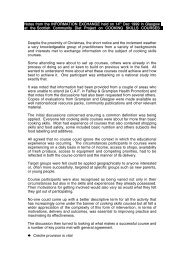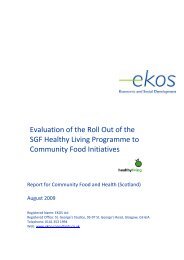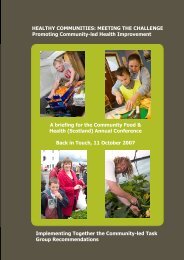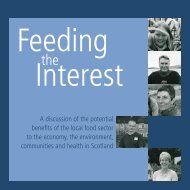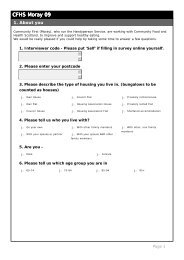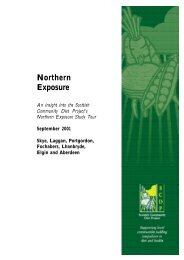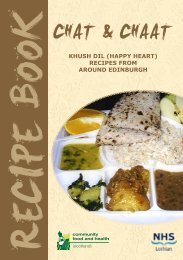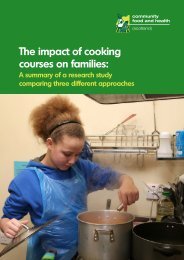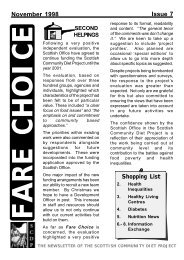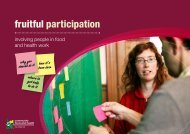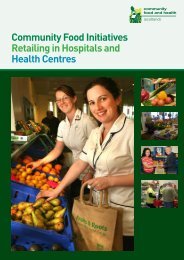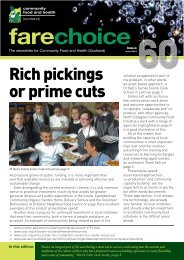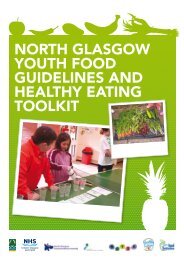Making a Difference - Community Food and Health
Making a Difference - Community Food and Health
Making a Difference - Community Food and Health
Create successful ePaper yourself
Turn your PDF publications into a flip-book with our unique Google optimized e-Paper software.
Workshop Two: <strong>Food</strong>, health <strong>and</strong> homelessness<br />
___________________________________________________________________<br />
M<strong>and</strong>y Ramage <strong>and</strong> Diane Hendry, R<strong>and</strong>olph Crescent Hostel, Edinburgh<br />
___________________________________________________________________<br />
This workshop allowed participants to hear about the R<strong>and</strong>olph Crescent Hostel which<br />
provides support to people who are in recovery from alcohol <strong>and</strong> drug addiction. M<strong>and</strong>y<br />
delivers a participatory education programme around cooking skills, budgeting for food,<br />
<strong>and</strong> basic nutrition to people using the service. The hostel is also developing a market<br />
garden <strong>and</strong> this workshop provided an opportunity to learn <strong>and</strong> share experiences from<br />
this work.<br />
This workshop focused on sharing information regarding their programme of support, a<br />
12- week programme for recovery <strong>and</strong> support which began in 2007. To obtain a<br />
placement on the programme, the residents must have a referral from their GP, harm<br />
protection worker, social worker or a through a court referral. People are unable to selfrefer<br />
<strong>and</strong> must be over 18 years of age.<br />
Activities begin every morning of the programme <strong>and</strong> include alternative/natural therapies;<br />
discussions such as reasons for developing an addiction; physical activity; <strong>and</strong> a<br />
participatory education programme.<br />
Participatory Education Programme<br />
The following is an example of activity in this programme: <strong>Food</strong> Skills Course. At the<br />
beginning of the programme it is common that residents are unable to cook. However after<br />
a period of experimenting with cooking different recipes each night their skills develop <strong>and</strong><br />
improve. Sometimes the residents experience tasting some food items for the first time,<br />
e.g. fish such as salmon, or vegetables such as peppers. The residents are also shown<br />
how to budget their money for spending on food by planning their daily meals <strong>and</strong> writing<br />
their own weekly shopping list. The hostel currently has facilities to grow herbs in window<br />
boxes <strong>and</strong> is planning to develop a market garden in order to plant <strong>and</strong> grow seasonal<br />
organic vegetables in 2009. Due to limited resources, the staff are currently unable to<br />
formally monitor or evaluate the food skills course. However, staff have received excellent<br />
feedback from the participants about how helpful <strong>and</strong> beneficial the programme is in<br />
gaining a life skill.<br />
The success rate of the whole programme is high, with residents generally going on to be<br />
re-housed <strong>and</strong> live independently. The realisation of positive outcomes from the<br />
participatory education programme around cooking skills, budgeting for food, <strong>and</strong> basic<br />
nutrition occurred to the team when the participants were re-housed. Previous participants<br />
reported that they have been cooking with friends <strong>and</strong> passing on their recipes.



